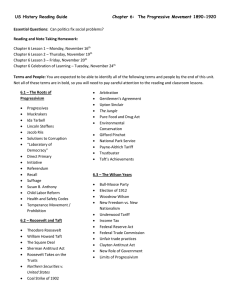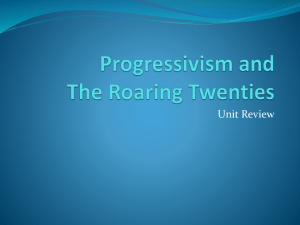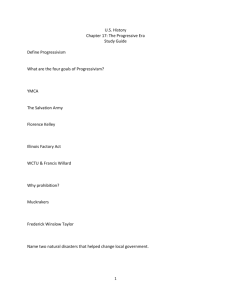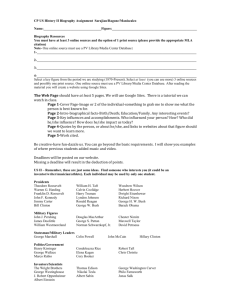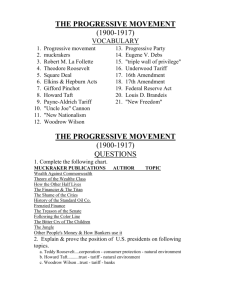Document 14118534
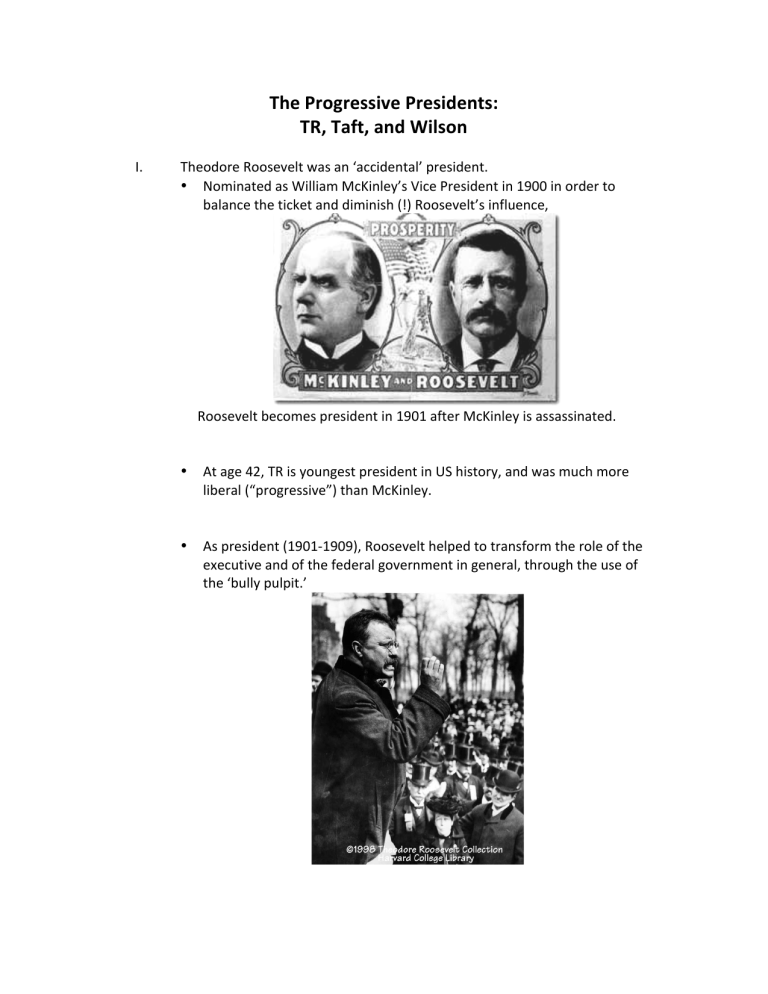
I.
The Progressive Presidents:
TR, Taft, and Wilson
Theodore Roosevelt was an ‘accidental’ president.
•
Nominated as William McKinley’s Vice President in 1900 in order to balance the ticket and diminish (!) Roosevelt’s influence,
Roosevelt becomes president in 1901 after McKinley is assassinated.
• At age 42, TR is youngest president in US history, and was much more liberal (“progressive”) than McKinley.
• As president (1901-‐1909), Roosevelt helped to transform the role of the executive and of the federal government in general, through the use of the ‘bully pulpit.’
• Roosevelt saw the role of the federal government as the protector of the public welfare: in this capacity, his administration filed 44 suits against unfair business ‘trusts’ (TR known as “trust-‐buster”);
supported the labor union in a bitter coal strike in NE PA in 1902;
signed the Pure Food and Drug Act and the Meat Inspection Act in 1906
(response to “The Jungle”).
Meat Inspection Bill Passes the Senate
Direct Consequence of Disclosures Made in Upton Sinclair's Novel, "The Jungle."
Added Without Debate to Agricultural Bill as a Rider
ITS ADOPTION UNEXPECTED
New York Times 26 May 1906
WASHINGTON -‐-‐ The Senate to-‐day furnished another surprise in the line of radical legislation by passing the Beveridge Meat Inspection bill. Fifteen minutes before it was passed not a Senator would have admitted that the bill had a ghost of a chance to become a law certainly not this session. Its passage is the direct consequence of the disclosures made in Upton Sinclair's novel, "The Jungle."
• Also involved in conservation of natural resources, passing the Newlands
Reclamation Act of 1902 to provide government funding for large-‐scale irrigation projects across the West and ultimately, with the support of
Chief Forester Gifford Pinchot, set aside over 170 million acres of public land as national parks and monuments.
• Remaining extremely popular throughout his presidency, Roosevelt could have easily won a third term, but instead stepped aside in favor of his
‘hand-‐picked successor,’ William Howard Taft, his Secretary of War.
II. William Howard Taft easily won election in 1908 over the
Democrats’ erstwhile candidate, William Jennings Bryan.
•
Taft soon demonstrated that he was nowhere near the skillful politician that Roosevelt had been, and despite progressive sympathies he fell under the influence of more conservative party leaders—greatly angering
TR.
• Taft recognized that his techniques would differ from those of his predecessor. Unlike Roosevelt, Taft did not believe in the stretching of
Presidential powers. He once commented that Roosevelt "ought more often to have admitted the legal way of reaching the same ends."
•
Taft alienated many liberal Republicans who later formed the Progressive
Party, by defending the Payne-‐Aldrich Act which unexpectedly continued high tariff rates.
• He further antagonized progressives by upholding his Secretary of the
Interior, accused of failing to carry out Roosevelt's conservation policies.
(“Ballinger-‐Pinchot controversy”)
• In the angry progressive onslaught against Taft, little attention was paid to the fact that his administration initiated 80 antitrust suits in just four years, and that Congress submitted to the states amendments for a
Federal income tax and the direct election of Senators—long-‐time progressive goals.
• A postal savings system was established, and the Interstate Commerce
Commission was directed to set railroad rates.
• In 1912, when the Republicans re-‐nominated Taft, Roosevelt bolted the party to lead the Progressives, thus guaranteeing the election of
Woodrow Wilson.
II.
Woodrow Wilson became the first southern president since before the Civil
War. Won 435 electoral votes to Roosevelt’s 88 and Taft’s 8, despite carrying only 6 million of 15 million popular votes cast. Socialist Eugene Debs gained nearly 1 million popular votes (no electoral votes).
• Domestic issues dominated his first term, with a program known as the “New
Freedom.”
•
Major accomplishments included: o Establishment of the Federal Reserve System
o Strengthened anti-‐trust legislation (Clayton Antitrust Act of 1914) o Creation of Federal Trade Commission to regulate businesses involved in interstate or foreign trade
o Passage of the Underwood Tariff, lowest tariff in decades o Ratification of 16 th income tax (1913)
Amendment, establishing a graduated federal o Ratification of 17 th senators (1913)
Amendment, allowing the direct election of
•
Wilson, however, ignored the plight of African Americans and segregation remained firmly entrenched during the Progressive Era.
•
Wins re-‐election in 1916 on his record of domestic accomplishments and the fact that “he kept us out of war”, but within months US enters WWI, which dominates and largely derails Wilson’s second term.
